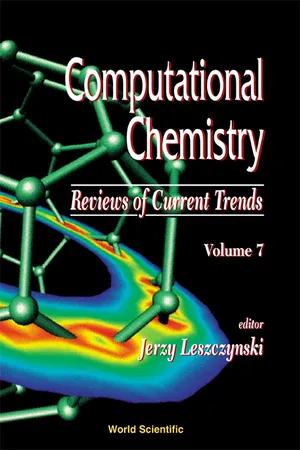
- 260 pages
- English
- PDF
- Available on iOS & Android
Computational Chemistry: Reviews Of Current Trends, Vol. 7
About this book
Vast progress in the area of computational chemistry has been achieved in the last decade of the 20th century. Theoretical methods such as quantum mechanics, molecular dynamics and statistical mechanics have been successfully used to characterize chemical systems and to design new materials, drugs and chemicals. With this in mind, the contributions to this volume were collected.The contributions include predictions of the transport properties of molecular structures at the atomic level, which is of importance in solving crucial technological problems such as electromigration or temperature and statistical effects.Although currently restricted to calculation of systems containing no more than a few thousand atoms, nonempirical (ab initio) quantum chemical methods are quickly gaining popularity among researchers investigating various aspects of biological systems. The development of efficient methods for application to large molecular systems is the focus of two chapters. They include an overview of development and applications of parallel and order-N Density Functional Theory (DFT) methods and the development of new methods for calculation of electron dynamical correlation for large molecular systems.For small and medium-sized molecules, chemical accuracy of quantum chemical predictions has already been achieved in many fields of application. Among the most accurate methods are Coupled Cluster (CC) approaches, but their accuracy comes at a price — such methodologies are among the most computationally demanding. Two chapters review approximate strategies developed to include triple excitations within the coupled cluster and the performance of the explicitly correlated CC method based on the so-called R12 ansatz.The Quantum Molecular Dynamics (QMD) approach has revolutionized electronic structure calculations for molecular reactions. The last chapter of the volume provides details of QMD studies on interconversion of nitronium ions and nitric acid in small water clusters.
Frequently asked questions
- Essential is ideal for learners and professionals who enjoy exploring a wide range of subjects. Access the Essential Library with 800,000+ trusted titles and best-sellers across business, personal growth, and the humanities. Includes unlimited reading time and Standard Read Aloud voice.
- Complete: Perfect for advanced learners and researchers needing full, unrestricted access. Unlock 1.4M+ books across hundreds of subjects, including academic and specialized titles. The Complete Plan also includes advanced features like Premium Read Aloud and Research Assistant.
Please note we cannot support devices running on iOS 13 and Android 7 or earlier. Learn more about using the app.
Information
Table of contents
- CONTENTS
- Preface
- Chapter 1. Molecules as Components in Electronic Devices: A First-Principles Study
- Chapter 2. Tackling DNA with Density Functional Theory: Development and Application of Parallel and Order-N DFT Methods
- Chapter 3. Low-Scaling Methods for Electron Correlation
- Chapter 4. Iterative and Non-Iterative Inclusion of Connected Triple Excitations in Coupled-Cluster Methods. Theory and Numerical Comparisons for Some Difficult Examples
- Chapter 5. Explicitly Correlated Coupled Cluster R12 Calculations
- Chapter 6. Ab Initio Direct Molecular Dynamics Studies of Atmospheric Reactions: Interconversion of Nitronium Ion and Nitric Acid in Small Clusters
- Index